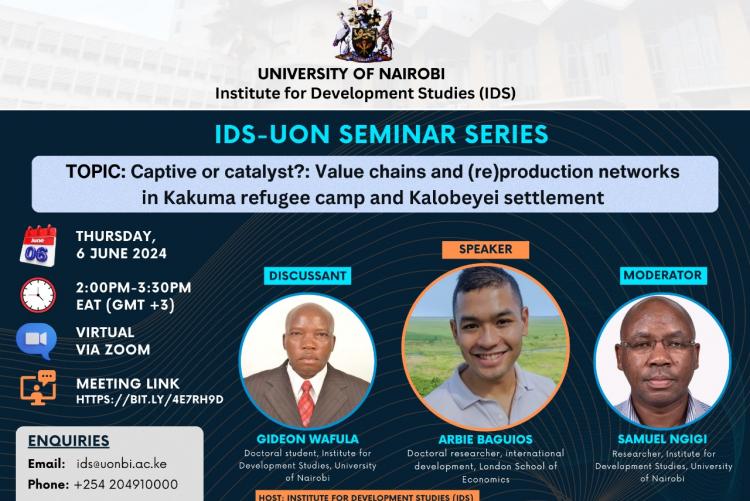The Institute for Development Studies (IDS) held its weekly seminar series on Thursday, June 6th, 2024, focusing on the theme "Captive or Catalyst? Value Chains and (Re)Production Networks in Kakuma Refugee Camp and Kalobeyei Settlement." The seminar took place from 2:00 pm to 3:30 pm Via Zoom.
The guest speaker for the event was Arbie Baquios, a doctoral researcher in international development at the London School of Economics. Providing insights as the discussant was Gideon Wafula, a doctoral student at the Institute for Development Studies, University of Nairobi. Moderating the seminar was Samuel Ngigi, a researcher at the Institute for Development Studies, University of Nairobi.
Arbie Baquios presented his research offering a critical understanding of "Captive or Catalyst? The Political Economy of Markets and Self-Reliance in Kakuma Camp/Kalobeyei Settlement." This study sheds light on the intricate dynamics at play within refugee communities, delving into the complex interplay between market forces and the aspirations for self-sufficiency among displaced populations.
By examining the economic structures within Kakuma Refugee Camp and Kalobeyei Settlement, the research seeks to understand whether these environments serve as mere holding spaces, where refugees are economically captive, or as potential catalysts for self-reliance and empowerment.
The findings highlight the resilience and resourcefulness of refugees in navigating market economies within the constraints of their circumstances. Despite facing numerous challenges, including limited access to resources and legal barriers to employment, refugees demonstrate agency in establishing informal economies and entrepreneurial ventures.
Moreover, the research underscores the importance of policy interventions and support mechanisms in fostering economic autonomy and self-reliance among displaced communities. It emphasizes the need for inclusive economic policies that recognize and harness the skills and potential of refugees, thereby transforming camps and settlements into dynamic spaces of economic opportunity.
In conclusion, "Captive or Catalyst?" offers valuable insights into the political economy of refugee settings, advocating for approaches that enable refugees to not only survive but thrive as active participants in the market economy, ultimately contributing to their own resilience and development.

